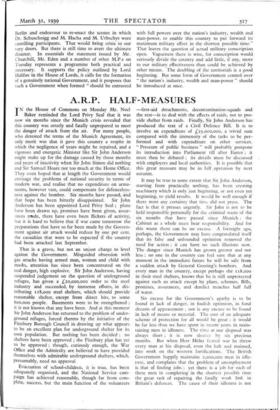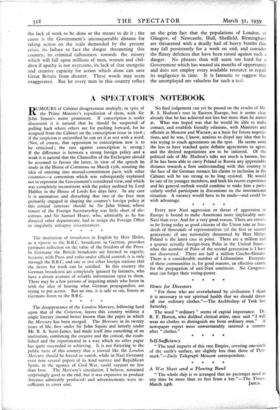A.R.P. HALF-MEASURES
I N the House of Commons on Monday Mr. Noel Baker reminded the Lord Privy Seal that it was now six months since the Munich crisis revealed that this country was utterly and fatally unprepared to meet the danger of attack from the air. For many people, who detested the terms of the Munich Agreement, its only merit was that it gave this country a respite in which the negligence of years might be repaired, and a vigorous and energetic Minister like Sir John Anderson might make up for the damage caused by those months and years of inactivity when Sir John Simon did nothing and Sir Samuel Hoare not too much at the Home Office. They even hoped that at length the Government would envisage the problems of national security in terms of modern war, and realise that no expenditure on arma- ments, however vast, could compensate for defenceless- ness against the bomber. Six months have passed, and that hope has been bitterly disappointed. Sir John Anderson has been appointed Lord Privy Seal ; plans have been drawn up, promises have been given, assur- ances made, there have even been flickers of activity, but it is hard to believe that if war came tomorrow the preparations that have so far been made by the Govern- ment against air attack would reduce by one per cent. the casualties that were to be expected if the country had been attacked last September.
That is a grave, but not an unjust charge to level against the Government. Misguided obsession with gas attacks having armed man, woman and child with masks, attention has since been concentrated on the real danger, high explosive. Sir John Anderson, having suspended judgement on the question of underground refuges, has given a £20,000,000 order to the steel industry and succeeded, by immense efforts, in dis- tributing i i 8,000 steel shelters, which should provide reasonable shelter, except from direct hits, to some 600,000 people. Basements were to be strengthened ; it is not known that any have been. And at this moment Sir John Anderson has returned to the problem of under- ground refuges, forced thereto by the initiative of the Finsbury Borough Council in drawing up what appears to be an excellent plan for underground shelter for its own population. But nothing has been decided ; no shelters have been approved ; the Finsbury plan has yet to be approved ; though, curiously enough, the War Office and the Admiralty are believed to have provided themselves with admirable underground shelters, which, presumably, need no approval.
Evacuation of school-children, it is true, has been adequately organised, and the National Service cam- paign has achieved reasonable, though far from com- plete, success, but the main function of the volunteers —first-aid detachments, decontamination-squads and the rest—is to deal with the effects of raids, not to pro- vide shelter from raids. Finally, Sir John Anderson has produced the text of a Civil Defence Bill. It is to involve an expenditure of £25,000,000, a trivial sum compared with the immensity of the tasks to be per- formed and with expenditure on other services. " Pressure of public business " will probably postpone its introduction into Parliament till after Easter ; it must then be debated ; its details must be discussed with employers and local authorities. It is possible that this great measure may be in full _operation by next autumn.
It may be true to some extent that Sir John Anderson, starting from practically nothing, has been creating machinery which is only just beginning, or not even yet beginning, to yield results. It would be well enough if there were any certainty that time did not press. The fact is that it presses urgently. Sir John is not to be held responsible personally for the criminal waste of the six months that have passed since Munich ; the Cabinet as a whole must bear responsibility. And for this waste there can be no excuse. A fortnight ago, perhaps, the Government may have congratulated itself that its false and unfounded optimism removed the need for action ; it can have no such illusions now. The danger since Munich has grown greater and not less ; no one in the country can feel sure that at any moment in the immediate future he will be safe from a sudden attack by General Goering's bombers. And every man in the country, except perhaps the i ][8,000 in their steel shelters, knows that he is still unprotected against such an attack except by plans, schemes, Bills, promises, assurances, and derelict trenches half full of water.
No excuse for the Government's apathy is to be found in lack of danger, in foolish optimism, in fond dreams of appeasement ; nor is any excuse to be found in lack of means or material. The cost of an adequate scheme of protection for all would be great ; it would be far less than we have spent in recent years in main- taining men in idleness. The time at our disposal was always short ; it is now shorter by six precious months. But when Herr Hitler feared war he threw every man at his disposal, even the halt and maimed, into work on the western fortifications. The British Government happily maintains 2,000,000 men in idle- ness, and complains that the problem of unemployment is that of finding jobs ; yet there is a job for each of these men in completing in the shortest possible time the great task of repairing the fatally weak link in Britain's defences. The cause of their idleness is not the lack of work to be done or the means to do it ; the cause is the Government's unconquerable distaste for taking action on the scale demanded by the present crisis, its failure to face the danger threatening this country, its criminal callousness towards the misery which will fall upon millions of men, women and chil- dren if apathy is not overcome, its lack of that energetic and creative capacity for action which alone can save Great Britain from disaster. These words may seem exaggerated. But let every man in this country reflect on the grim fact that the populations of London, of Glasgow, of Newcastle, Hull, Sheffield, Birmingham are threatened with a deadly hail of heavy bombs that may fall persistently for a week on end, and consider the flimsy defences that have been raised against such a danger. No phrases then will seem too hard for a Government which has wasted six months of opportuntiy and does not employ every available resource to repair its negligence in time. It is fantastic to suggest that the unemployed are valueless for such a task.



































































 Previous page
Previous page